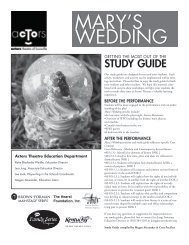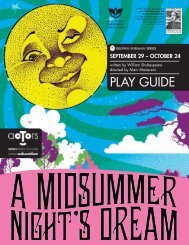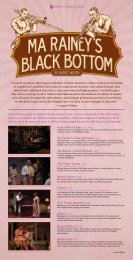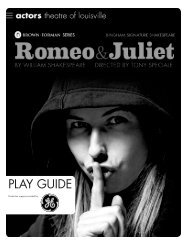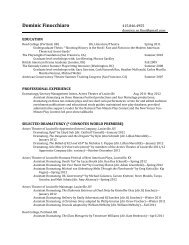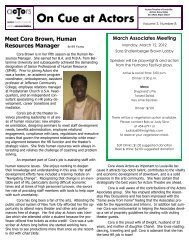Twelfth Night - Actors Theatre of Louisville
Twelfth Night - Actors Theatre of Louisville
Twelfth Night - Actors Theatre of Louisville
Create successful ePaper yourself
Turn your PDF publications into a flip-book with our unique Google optimized e-Paper software.
WRITING PORTFOLIO<br />
Note for teachers: All Writing Portfolio prompts have been designed to correspond with Kentucky<br />
Department <strong>of</strong> Education Core Content for Writing Assessment.<br />
1. LITERARY WRITING<br />
Shakespeare wrote his plays with a very specific setting and audience in mind. Write a scene specifically<br />
to be performed in your class. These may be read aloud or performed, and should be written<br />
for this distinct setting. When writing, take into consideration the people who will be viewing it<br />
and how the scene will best affect them.<br />
2. TRANSACTIVE WRITING<br />
Delve further into a specific time in Shakespeare’s life (i.e. writing for the Globe, arriving in<br />
London, his childhood, his retirement). Choose a period that interests you and see how much you<br />
can find out about Shakespeare and his surroundings at this point. This can be developed into a<br />
research paper or presentation, possibly stringing together all presentations in chronological order to<br />
create a “living timeline” <strong>of</strong> Shakespeare’s life.<br />
3. PERSONAL WRITING<br />
Imagine yourself as a lower-class worker who goes to the Globe to watch a play as a groundling. In<br />
the form <strong>of</strong> a journal entry, detail your experience attending the theatre. Include why you went to<br />
the theatre that day, what you saw, and what the experience was like.<br />
Holly Twyford & Ian Merrill Peakes<br />
Photo: Carol Pratt<br />
<strong>Twelfth</strong><strong>Night</strong><br />
Fund for the Arts<br />
Members Agency<br />
Study Guide<br />
Getting the most out <strong>of</strong> the Study Guide for<br />
<strong>Twelfth</strong> <strong>Night</strong><br />
Our Study Guides are designed with you and your classroom in mind, with information<br />
and activities that can be implemented in your curriculum. Feel free to<br />
copy the study guide for other teachers and for students. You may wish to cover<br />
some content before your workshops and the performance; some content is more<br />
appropriate for discussion afterwards. Of course, some activities and questions will<br />
be more useful for your class, and some less. Feel free to implement any article,<br />
activity, writing portfolio exercise or post-show discussion question as you see fit.<br />
Before the Performance:<br />
Using the articles in the study guide, students will be more engaged in the performance.<br />
Our articles relate information about things to look for in the show and<br />
information on Shakespeare. In addition, there are articles on the various play<br />
adaptations and movies inspired by Shakespeare work. All <strong>of</strong> this information,<br />
combined with our in-classroom workshops, will keep the students attentive and<br />
make the performance an active learning experience.<br />
After the Performance:<br />
With the play as a reference point, our questions, activities, and writing portfolio<br />
exercises can be incorporated into your classroom discussions and can enable students<br />
to develop their higher level thinking skills. Our study guide for Tweflth<br />
<strong>Night</strong> addresses specific Core Content, for example (more core content found in<br />
the guide):<br />
AH-M 3.1.31-Elements <strong>of</strong> drama (Adaptation article)<br />
AH-H 3.3.36-Renaissance 1760-1870/Shakespeare<br />
AH-H 3.1.34-Identify skills and training necessary for a variety <strong>of</strong> careers related<br />
to drama. (Careers in <strong>Theatre</strong> Article)<br />
If you have questions or suggestions for improvements in our study guides,<br />
please contact Danielle Minnis, Education Director, at 502-584-1265 or<br />
DMinnis@<strong>Actors</strong><strong>Theatre</strong>.org.<br />
actors theatre <strong>of</strong> louisville ■ 316 West Main Street ■ <strong>Louisville</strong>, KY 40202-4218<br />
Box <strong>of</strong>fice 502-584-1205 ■ Group Sales 502-585-1210 ■ Business Office 502-584-1265<br />
<strong>Actors</strong><strong>Theatre</strong>.org<br />
Study Guide compiled by Melanie Anne Henry<br />
and Jana Goold unless otherwise noted.
Play Synopsis /<br />
Character Discussion<br />
With a plot chock-full <strong>of</strong> hidden love, foolery, music, and an ultimately<br />
triumphant ending, <strong>Twelfth</strong> <strong>Night</strong> has delighted audiences for<br />
generations. <strong>Twelfth</strong> <strong>Night</strong>, called “the funniest <strong>of</strong> Shakespeare’s plays”<br />
by critic Harold Bloom, was the last <strong>of</strong> his light comedies before venturing<br />
into a line <strong>of</strong> tragedies and darker comedies known to modern<br />
scholars as “problem plays.”<br />
At the beginning <strong>of</strong> <strong>Twelfth</strong> <strong>Night</strong>, Viola and a sea captain, who have<br />
been rescued from a shipwreck, land on the coast <strong>of</strong> Illyria; and Viola<br />
believes that her twin brother, Sebastian, has been lost in the wreck.<br />
Defenseless, Viola decides to disguise herself as a young man and seek<br />
service with Duke Orsino, whom she hears is noble and generous.<br />
Unbeknownst to her, however, Sebastian has been rescued by Antonio,<br />
another sea captain, and has landed in a different state further up the<br />
coast. He begins to make his way to Illyria with Antonio.<br />
Under the name Cesario, Viola gains Orsino’s favor and, although she<br />
falls in love with Orsino herself, consents to be his go-between with<br />
Olivia, the noblewoman he loves. Olivia, however, refuses every plea <strong>of</strong><br />
marriage because she is in mourning for her dead brother. In Olivia’s<br />
household, the only servant who seems to enjoy the enforced mourning<br />
for Olivia’s brother is the humorless, uptight Malvolio. Olivia’s kinsman,<br />
Sir Toby Belch, and his friend Sir Andrew Aguecheeck (one <strong>of</strong><br />
Olivia’s suitors) spend their nights carousing, aided and abetted by<br />
Maria, Olivia’s maid.<br />
Cesario (Viola) arrives to carry “his” master’s pleas to Olivia, but to<br />
complicate matters, Olivia finds herself falling in love with Cesario.<br />
That night, Sir Toby, Sir Andrew, and Feste, Olivia’s fool, drink and<br />
revel. Maria begs them to be quieter; but when Malvolio comes in and<br />
reprimands them for their carelessness, they all decide to exact revenge<br />
on him. Maria forges a note that appears to have been sent by Olivia to<br />
a lover; when Malvolio receives it, he is sure that it is meant for him.<br />
The note instructs him to be surly with servants, to wear yellow stocking<br />
with cross-garters, and to smile continuously in Olivia’s presence.<br />
Cesario once again arrives at Olivia’s house to deliver Orsino’s pleas, and<br />
this time Olivia openly tells Cesario/Viola that she loves “him.” But<br />
Cesario must, <strong>of</strong> course, ignore Olivia’s advances. Meanwhile, the plot<br />
against Malvolio works to perfection: his strange antics in following the<br />
instructions <strong>of</strong> the note cause him to be imprisoned in a dark room as<br />
insane.<br />
Sir Toby, making more mischief, sets up a duel between Sir Andrew and<br />
Cesario, on the pretext that Cesario is a rival suitor for Olivia’s hand. As<br />
the two unwilling duelists prepare to fight, Antonio rushes in and,<br />
believing that Cesario is Sebastian, prevents the duel. However, when<br />
<strong>of</strong>ficers seize Antonio as a former enemy to Illyria, he asks Cesario for<br />
the money that he lent Sebastian earlier in the day and desperately needs<br />
now. Upon Cesario’s denial that “he” knows Antonio, the good captain’s<br />
faith in human nature is shaken. However, Viola, upon reflection, realizes<br />
that the name “Sebastian” has been spoken and hopes that her<br />
brother may be alive.<br />
Convinced that Cesario is a coward, Sir Andrew rushes out to challenge<br />
the page; but instead <strong>of</strong> Cesario he finds Sebastian. Olivia’s entrance<br />
prevents Sir Andrew from getting hurt. She, also believing Sebastian to<br />
David Marks, James Sugg<br />
Photo: Carol Pratt<br />
be Cesario, asks him to come speak with her. Olivia now convinces the<br />
not-unwilling Sebastian to marry her.<br />
The Duke and Cesario arrive before Olivia’s house, where they meet<br />
Antonio. When Antonio again reproaches Cesario — whom he still<br />
believes to be Sebastian — the Duke is completely baffled by Antonio’s<br />
insistence that the young man has just arrived in Illyria. Olivia enters<br />
and speaks lovingly to Cesario. Orsino is naturally angry at what he supposes<br />
has been Cesario’s treacherous attempt to win Olivia’s affections,<br />
and when a priest swears that he has recently married the couple,<br />
Orsino becomes furious.<br />
Sir Andrew and Sir Toby, meanwhile, have inadvertently picked a fight<br />
with Sebastian (believing him to be Cesario) and both enter wounded<br />
and bleeding. However, when Sebastian appears almost immediately, all<br />
the characters realize that they have been dealing with two persons.<br />
Matches are made all around: Sir Toby has married Maria, Orsino <strong>of</strong>fers<br />
to marry Viola, and Olivia and Sebastian remain together. Everyone is<br />
happy except Malvolio, who vows revenge on the whole group.<br />
Ault, Nelson A. and Lewis M. Magill. Synopses <strong>of</strong> Shakespeare’s Complete<br />
Plays. Paterson, New Jersey: Littlefied, Adams, and Co., 1962.<br />
Adapted by Jana Goold<br />
POST-SHOW DISCUSSION QUESTIONS<br />
Discussion Questions:<br />
<strong>Twelfth</strong> <strong>Night</strong> is hailed as one <strong>of</strong> Shakespeare’s best comedies.<br />
What elements <strong>of</strong> the play make it so entertaining? Think about<br />
characters, relationships, plot devices, language, etc. How<br />
does Shakespeare get an audience to laugh out loud?<br />
What do you find humorous about the treatment <strong>of</strong> Malvolio?<br />
Do you sympathize with the character, or is he too unlikable to<br />
pity? Relating the manipulation <strong>of</strong> Malvolio to situations in current<br />
movies (i.e. Meet the Parents, Home Alone), what is so<br />
funny about cruelty and human misfortune? What makes it<br />
entertaining to watch?<br />
Adaptations<br />
The pro<strong>of</strong> <strong>of</strong> the resilliance and continued<br />
power <strong>of</strong> William Shakespeare’s work is in the<br />
many adaptations that his plays have inspired.<br />
From movies that use the original dialogue to<br />
those that take Shakespeare’s situation as a<br />
springboard for contemporary characters, the<br />
number <strong>of</strong> Shakespeare adaptations is still<br />
growing. Here is a short list <strong>of</strong> some <strong>of</strong> the<br />
movies that have been created from the words<br />
<strong>of</strong> William Shakespeare.<br />
True to the text, time and setting:<br />
Early 20 th Century actor Sir Laurence Olivier<br />
starred in many film productions <strong>of</strong><br />
Shakespeare, including the film production <strong>of</strong><br />
Hamlet (1948). In Olivier’s productions, all <strong>of</strong><br />
the aspects <strong>of</strong> Shakespeare’s work are kept the<br />
same. Olivier is probably the most famous<br />
actor and interpreter <strong>of</strong> Shakespeare.<br />
Film director Roman Polanski did an adaptation<br />
<strong>of</strong> The Tragedy <strong>of</strong> Macbeth (1971) in which<br />
he didn’t change the setting, the time period, or<br />
the language. This adaptation is probably one<br />
<strong>of</strong> the darkest, because Polanski directed the<br />
film exactly one year after the Manson Family<br />
murdered his pregnant wife, Sharon Tate.<br />
<strong>Theatre</strong> and film director Julie Taymor has<br />
directed Shakespeare plays on the stage as well<br />
as films, such as The Tempest (1986), a recording<br />
<strong>of</strong> a stage production, and The Tragedy <strong>of</strong><br />
Titus Andronicus (1999), an imaginatively<br />
staged piece that cut the script but retained<br />
Shakespeare’s words, setting, and the time period.<br />
Irish actor Kenneth Branagh is also famous for<br />
directing different film versions <strong>of</strong><br />
Shakespeare’s work, including Hamlet (1996)<br />
and <strong>Twelfth</strong> <strong>Night</strong> (1988). He also starred in<br />
Hamlet.<br />
Actor/producer Mel Gibson starred in the<br />
1990 version <strong>of</strong> Hamlet directed by Franco<br />
Zeffirelli and also starring Helena Bonham<br />
Carter as Ophelia.<br />
Adaptations that change the time period:<br />
Famous actors Rupert Everett, Calista<br />
Flockhart, Kevin Kline, and Michelle Pfeiffer<br />
star in an adaptation <strong>of</strong> A Midsummer <strong>Night</strong>’s<br />
Dream (1999). This lavish adaptation takes<br />
place in the 1930s. Some <strong>of</strong> the script is cut,<br />
but the actors still keep to the original text.<br />
Probably the most popular film adaptation <strong>of</strong><br />
recent years is The Tragedy <strong>of</strong> Romeo and Juliet<br />
starring Leonardo DiCaprio and Claire Danes<br />
and directed by Baz Luhrmann (1996). This<br />
adaptation shifts the action to modern-day<br />
Verona and mixes modern music with<br />
Shakespeare’s original language, and used guns<br />
instead <strong>of</strong> swords for the battles.<br />
Another popular film adaptation <strong>of</strong><br />
Shakespeare is The Tragedy <strong>of</strong> Hamlet, Prince <strong>of</strong><br />
Denmark (2000) with Ethan Hawke as<br />
Hamlet, as well as Julia Stiles and Bill Murray,<br />
set in present-day Manhattan. Though the<br />
script is cut, Shakespare’s language is preserved.<br />
Adaptations that only preserve the situation:<br />
O, a modern-day version <strong>of</strong> Shakespeare’s<br />
Othello, was directed by Tim Blake Nelson and<br />
starred Julia Stiles, Mekhi Phifer, and Josh<br />
Hartnett, and translates Shakespeare’s story <strong>of</strong><br />
jealousy and murder to a private high school.<br />
The popular film 10 Things I Hate About You<br />
(1999), starring Julia Stiles, is an adaptation <strong>of</strong><br />
Shakespeare’s play The Taming <strong>of</strong> the Shrew.<br />
The play takes place in sixteenth-century<br />
Padua, Italy while the movie is set in a modernday<br />
California and follows the dating troubles<br />
<strong>of</strong> its characters in contemporary language.<br />
A movie adaptation <strong>of</strong> <strong>Twelfth</strong> <strong>Night</strong> is due out<br />
in 2006, titled She’s the Man. Directed by Andy<br />
Fickman, is a modern-day <strong>Twelfth</strong> <strong>Night</strong> in<br />
which Viola poses as her twin brother at his<br />
boarding school, getting very close to his roommate<br />
Duke.<br />
For more information on Shakespeare adaptations, visit<br />
the International Movie Database at www.imdb.com<br />
Further Reading<br />
<strong>Twelfth</strong> <strong>Night</strong><br />
reading companions<br />
<strong>Twelfth</strong> <strong>Night</strong>, or What You Will<br />
(Arden edition) by William Shakespeare<br />
Outlines <strong>of</strong> Shakespeare’s Plays by Karl J.<br />
Holzknecht, Raymond Ross, and<br />
Homer A. Watt<br />
Synopses <strong>of</strong> Shakespeare’s Complete Plays<br />
by Nelson A. Ault and Lewis M. Magill<br />
William Shakespeare: A Textual<br />
Companion by Stanley W. Wells,<br />
Gary Taylor, John Jowett, and<br />
William Montgomery<br />
Critical essays<br />
Modern critical interpretations <strong>of</strong><br />
<strong>Twelfth</strong> <strong>Night</strong> edited by Harold Bloom<br />
<strong>Twelfth</strong> <strong>Night</strong>: Contemporary<br />
Critical Essays edited by R.S. White<br />
<strong>Twelfth</strong> <strong>Night</strong> Critical Essays<br />
edited by Stanley Wells<br />
The Fools <strong>of</strong> Shakespeare<br />
by Frederick Warde<br />
Shakespeare<br />
Will in the World: How Shakespeare<br />
Became Shakespeare by Stephen<br />
Greenblatt<br />
Shakespeare our Contemporary<br />
by Jan Kott<br />
Shakespeare After All by Marjorie Garber<br />
Shakespeare: A Life in Drama<br />
by Stanley Wells<br />
Shakespeare’s <strong>Theatre</strong><br />
The First <strong>Night</strong> <strong>of</strong> <strong>Twelfth</strong> <strong>Night</strong> by<br />
Leslie Hotson<br />
The <strong>Twelfth</strong> <strong>Night</strong> <strong>of</strong> Shakespeare’s<br />
Audience by John W. Draper<br />
Shakespeare’s <strong>Theatre</strong> by Peter Thomson<br />
The Shakespearean Stage, 1574 – 1642<br />
by Andrew Gurr
CAREERS IN THEATRE<br />
An interview with Aaron Posner, <strong>Twelfth</strong> <strong>Night</strong> adapter/director<br />
As a child, Aaron Posner loved literature. Reading everything<br />
“from comic books to Dostoevsky,” he quickly realized<br />
that a well-told story was one <strong>of</strong> life’s greatest joys.<br />
Today, as an adapter/director, Posner has made a career<br />
out <strong>of</strong> bringing great stories to life on the stage. This season<br />
at ATL he is directing his adaptation <strong>of</strong> Shakespeare’s<br />
classic comedy <strong>Twelfth</strong> <strong>Night</strong>.<br />
Q: How did you get into adapting? What drew you to the<br />
pr<strong>of</strong>ession?<br />
A: By chance I went to Northwestern University because<br />
I heard it was good for theatre. What I didn’t know was<br />
that the secret, hidden strength <strong>of</strong> the Northwestern theatre<br />
department was what was then called the Department<br />
<strong>of</strong> Interpretations, which later became the Department <strong>of</strong><br />
Performance Studies. The department focused on the<br />
adaptation <strong>of</strong> literature for performance and the study <strong>of</strong><br />
literature through performance. There was a pr<strong>of</strong>essor<br />
there named Frank Galati; I wandered into a class <strong>of</strong> his<br />
my freshman year and immediately transferred to<br />
Performance Studies and followed him around for four<br />
years.<br />
Q: How do adapting and directing fit together into one<br />
pr<strong>of</strong>ession?<br />
A: I adapt as part <strong>of</strong> the directing process. When I’m<br />
adapting, I’m adapting from the point <strong>of</strong> view <strong>of</strong> a director.<br />
Even though other people have directed my adaptations,<br />
I am still approaching an adaptation from the point<br />
<strong>of</strong> view <strong>of</strong>, “How am I going to put this on stage?” I don’t<br />
think <strong>of</strong> it as writing a script at all. So when I look at a<br />
Shakespearean text, it’s the same questions that any director<br />
would have about how am I going to enter into this<br />
play? What does it mean to me personally? What is the<br />
story I’m trying to tell? For me, it’s not two different<br />
processes; it’s one. It starts with, “I love this work,” and<br />
ends when it’s being performed in front <strong>of</strong> an audience.<br />
Q: Is <strong>Twelfth</strong> <strong>Night</strong> the first Shakespearean adaptation<br />
you’ve done?<br />
A: It’s a really nebulous term: adapting. Because in its<br />
broadest sense, every time somebody has done a<br />
Shakespeare play in a different time period, that’s sort <strong>of</strong><br />
an adaptation. I’ve done that before, but this is the first<br />
one that I’ve called an adaptation. I just went further by<br />
cutting a lot, cutting some characters, moving some<br />
scenes. But I still don’t think I would have called it an<br />
adaptation until I cut all the songs and put in all new, contemporary<br />
music. That somehow felt like crossing a line<br />
where I should acknowledge that it’s a slightly different<br />
thing than the original.<br />
Q: What made you<br />
decide to update all the<br />
music in the show?<br />
A: One <strong>of</strong> the greatest<br />
things about being a<br />
director is that when I’m<br />
working on these plays, I<br />
carry them around in my<br />
head and in my body<br />
with me for a period <strong>of</strong><br />
months. Thinking about<br />
them, seeing what I can find about them, seeing how they<br />
open up for me as I go through my life and looking at the<br />
world through the frames <strong>of</strong> these various plays is one <strong>of</strong><br />
the things that I love about being a theatre artist and<br />
working in this pr<strong>of</strong>ession. <strong>Twelfth</strong> <strong>Night</strong> is a play I’ve seen<br />
many times, loved for years, wanted to do, almost done<br />
before, so it was a delight to be carrying around in my<br />
head. One day I was sitting around thinking about it a little<br />
bit and I put on this CD <strong>of</strong> my friend Craig Wright.<br />
The song “I’ve Got a Thing for You” that we use as the<br />
curtain call started playing. I was sort <strong>of</strong> bopping around<br />
my apartment to it and I suddenly went, “That’s it! That<br />
is the song that captures the spirit <strong>of</strong> playfulness, <strong>of</strong> love,<br />
<strong>of</strong> irreverent and enjoyable use <strong>of</strong> language!” It all <strong>of</strong> a sudden<br />
hit me that this was what I wanted the play to be. I<br />
wanted to make it make sense, I wanted to make sense <strong>of</strong><br />
the relationships, and I wanted a rollicking good time.<br />
Q: You’ve adapted many works <strong>of</strong> fiction for the stage as<br />
well. How is that different than adapting Shakespeare?<br />
A: When you’re adapting literature, there’s a lot more<br />
writing. I haven’t had the audacity to write any original<br />
material for a Shakespearean text, but I am happy to cut<br />
and move things around to make it a more vital, engaging<br />
experience for audiences today. Whenever I’m adapting, I<br />
look for the “way in.” What does this play say to me?<br />
What do I have to say to this play? What do my experiences<br />
in the world, in the theatre, with people I’ve known<br />
allow me to <strong>of</strong>fer the play? How can I use everything that<br />
makes me who I am to bring out elements in this play that<br />
I think are unique or important in illuminating the piece?<br />
It’s all about meeting the needs <strong>of</strong> the work.<br />
Q: What’s up next for you?<br />
A: I hope to someday have a play that I write from scratch<br />
that is worthy <strong>of</strong> being out there in the world. For now,<br />
I’m working at great places across the country doing a<br />
wide variety <strong>of</strong> work that I really love doing. I’m adapting,<br />
consulting, doing freelance directing, and teaching. I’m in<br />
a beautiful position in terms <strong>of</strong> my work right now.<br />
Cast <strong>of</strong> Characters<br />
Viola a woman shipwrecked in<br />
an unknown country. Later disguised<br />
as Cesario, page to Orsino.<br />
Sebastian Viola’s twin brother.<br />
Orsino Duke <strong>of</strong> Illyria,<br />
a romantic young man.<br />
Olivia a rich countess.<br />
Sir Toby Belch Olivia’s<br />
kinsman.<br />
Sir Andrew Aguecheek<br />
Olivia’s suitor and Sir Toby’s<br />
friend.<br />
Malvolio Olivia’s humorless<br />
steward.<br />
Maria Olivia’s maid.<br />
Feste Olivia’s fool, or clown<br />
Antonio a sea captain and friend<br />
<strong>of</strong> Sebastian<br />
Sea captain a man who helps<br />
Viola<br />
William Shakespeare:<br />
The Man behind the Words<br />
Throughout the decades, William Shakespeare has<br />
come to be revered as one <strong>of</strong> the greatest playwrights<br />
in the history <strong>of</strong> theatre. Not only are his works continually<br />
performed all over the world, but numerous<br />
theatres exist solely to produce his plays.<br />
Shakespeare was born in Stratford-upon-Avon,<br />
England on April 23, 1564. He came from a family<br />
described as “honest, hard-working, middle-class<br />
stock.” He received minimal education and by the<br />
time he was 18 he was married to a girl by the name<br />
<strong>of</strong> Anne Hathaway. His first daughter, Susanna, was<br />
born the next year, followed by his twins, Hamnet<br />
and Judith, in 1585.<br />
In the late 1580s, Shakespeare moved to London<br />
(96 miles away — about a four-day walk — from<br />
Stratford) in an attempt to financially support his<br />
family through the theatre. He began as an actor,<br />
but soon started writing plays and poetry as well. By<br />
1592, he was known throughout the London theatre<br />
scene as an up-and-coming young artist. When<br />
the plague epidemic closed down all <strong>of</strong> London’s<br />
theatres, Shakespeare earned his keep writing narrative<br />
poems — Venus and Adonis and The Rape <strong>of</strong><br />
Lucrece — which he dedicated to the young Earl <strong>of</strong><br />
Southampton, his primary patron at the time.<br />
In the spring <strong>of</strong> 1594, Shakespeare joined a company<br />
<strong>of</strong> actors known as the Lord Chamberlain’s<br />
Company, called such because they were under the<br />
patronage <strong>of</strong> the Chamberlain to Queen Elizabeth I.<br />
The troupe began performing at the <strong>Theatre</strong>, but<br />
when their lease on the land expired, they took matters<br />
into their own hands. Illegally dismantling the<br />
<strong>Theatre</strong> and carrying its timbers across the Thames<br />
River, the company built what would become one<br />
<strong>of</strong> the most famous theatres in England: the Globe.<br />
Soon after the move, Shakespeare became the principal<br />
playwright for the company, providing actors<br />
with approximately two plays a year. He was also<br />
highly involved in the management <strong>of</strong> the troupe<br />
and received a share <strong>of</strong> all pr<strong>of</strong>its. During this period,<br />
Shakespeare gained recognition as one <strong>of</strong><br />
England’s premiere playwrights, while each <strong>of</strong> his<br />
plays received tremendous popular acclaim.<br />
In 1603, when King James I took over England after<br />
Queen Elizabeth’s death, Shakespeare’s troupe<br />
became known as the King’s Men and performed<br />
<strong>of</strong>ten in the King’s court. They were now recognized<br />
as Grooms <strong>of</strong> the Chamber, or minor court <strong>of</strong>ficials.<br />
At this time, Shakespeare gave up acting completely<br />
and became solely a playwright/manager for the<br />
company.<br />
In 1611, Shakespeare retired to his home in<br />
Stratford, where his wife and children had remained<br />
all these years, supposedly to spend time in “ease,<br />
retirement, and the conversation <strong>of</strong> friends.” By this<br />
point, he had come to be quite a wealthy man and<br />
was able to live comfortably. He did, however, write<br />
his final two plays (The Two Noble Kinsmen and<br />
Henry VIII) in Stratford, supposedly aided by John<br />
Fletcher, the new dramatist for the King’s Men.<br />
Shakespeare died on April 23, 1616. Those who<br />
knew him remembered him as “a handsome wellshaped<br />
man, very good company, and <strong>of</strong> a ready and<br />
pleasant wit.” Today he is remembered for his literary<br />
genius and timeless stories.<br />
Discussion Questions:<br />
Shakespeare was an extremely popular figure during<br />
his time and the general public adored him. How<br />
does knowing this, along with other elements <strong>of</strong><br />
Shakespeare’s life, enhance your understanding <strong>of</strong><br />
his plays?<br />
Discuss your previous experiences with Shakespeare<br />
and his works. Were they at all difficult to understand,<br />
or tedious to read or view? What has helped<br />
make them more accessible and relevant to your<br />
own life? Having read the synopsis <strong>of</strong> <strong>Twelfth</strong> <strong>Night</strong>,<br />
what scene and/or relationship are you most excited<br />
to watch?<br />
Activity:<br />
Choose another player in Shakespeare’s theatre to<br />
research. It can be a person directly involved with<br />
theatre (i.e. Christopher Marlowe, a rival playwright,<br />
or Richard Burbage, lead actor in<br />
Shakespeare’s company) or an outside figure who<br />
affected his theatre (i.e. Queen Elizabeth I).<br />
Compare the person’s position then to a comparative<br />
position today. For example, if you choose an<br />
actor, compare the playing styles then and now;<br />
research should be done on the contemporary field<br />
as well, possibly including interviews with people in<br />
that career. Compare and contrast the person who<br />
fills the position today with the historical figure.
Shakespeare’s <strong>Theatre</strong><br />
The theatre scene that Shakespeare found in<br />
London in the late 1580s was very different<br />
from anything existing today. Because he was<br />
directly affected by and wrote specifically for<br />
this world, it is very important to understand<br />
how it worked.<br />
<strong>Theatre</strong> Districts in London<br />
There were two main theatre districts in<br />
London at this time. The first was known as<br />
Finsbury Field, an area north <strong>of</strong> the city, in<br />
which the older theatres were housed. The<br />
<strong>Theatre</strong> (Shakespeare and his company’s first<br />
performing space) and the Curtain were both<br />
located in this district and had been in existence<br />
up to 12 years before Shakespeare<br />
arrived. The second district, which developed<br />
during Shakespeare’s career, was known as<br />
Bankside, an area across the Thames River<br />
south <strong>of</strong> the city. This region, a bedraggled and<br />
sleazy section <strong>of</strong> London, was a fitting place for<br />
the theatre, which at the time was not quite<br />
reputable outside <strong>of</strong> the court. In fact, attending<br />
theatre was on par with attending a bearbaiting<br />
event, a favorite pastime in which<br />
crowds watched wild dogs attack and maul a<br />
bear that was chained to a post and blindfolded.<br />
In this area, one would find the Swan and<br />
the Globe (the famous theatre <strong>of</strong> Shakespeare’s<br />
company that was built from the wood <strong>of</strong> the<br />
<strong>Theatre</strong>). The Swan and the Globe were wellknown<br />
enemies throughout the period in<br />
which Shakespeare wrote for the theatre. In<br />
fact, the Swan’s playwright, Christopher<br />
Marlowe, was Shakespeare’s primary pr<strong>of</strong>essional<br />
rival at the time.<br />
The Performance Space<br />
The Globe <strong>Theatre</strong> was a circular wooden<br />
structure constructed <strong>of</strong> three stories <strong>of</strong> galleries<br />
(seats) surrounding an open courtyard. It<br />
was an open-air building (i.e. no ro<strong>of</strong>), and a<br />
rectangular platform projected into the middle<br />
<strong>of</strong> the courtyard to serve as a stage. The performance<br />
space had no front curtain, but was<br />
backed by a large wall with one to three doors<br />
out <strong>of</strong> which actors entered and exited. In front<br />
<strong>of</strong> the wall stood a ro<strong>of</strong>ed house-like structure<br />
supported by two large pillars, designed to provide<br />
a place for actors to “hide” when not in a<br />
scene. The ro<strong>of</strong> <strong>of</strong> this structure was referred to<br />
as the “Heavens.” The theatre itself housed up<br />
to 3,000 spectators, mainly because not all<br />
were seated. The seats in the galleries were<br />
reserved for people from the upper classes who<br />
came to the theatre primarily to “be seen.”<br />
These wealthy patrons were also sometimes<br />
allowed to sit on or above the stage itself as a<br />
sign <strong>of</strong> their prominence. These seats, known<br />
as the “Lord’s Rooms,” were considered the<br />
best in the house despite the poor view <strong>of</strong> the<br />
back <strong>of</strong> the actors. The lower-class spectators,<br />
however, stood in the open courtyard and<br />
watched the play on their feet. These audience<br />
members became known as “groundlings” and<br />
gained admission to the playhouse for as low as<br />
one penny. The groundlings were <strong>of</strong>ten very<br />
loud and rambunctious during the performances<br />
and would eat (usually hazelnuts), drink,<br />
and socialize as the play was going on, as well<br />
as shout directly to the actors on stage.<br />
Playwrights at this time were therefore forced<br />
to incorporate lots <strong>of</strong> action and bawdy humor<br />
in their plays in order to keep the attention <strong>of</strong><br />
their audience.<br />
The Performance<br />
During Shakespeare’s day, new plays were<br />
being written and performed continuously. A<br />
company <strong>of</strong> actors might receive a new play,<br />
prepare it, and perform it every week. Because<br />
<strong>of</strong> this, each actor in the company had a specific<br />
type <strong>of</strong> role that he normally played and<br />
could perform with little rehearsal. One<br />
possible role for a male company member, for<br />
example, would be the female ingenue. Because<br />
women were not allowed to perform on the<br />
stage at the time, young boys whose voices had<br />
yet to change generally played the female characters<br />
in the shows. Each company (composed<br />
<strong>of</strong> 10 – 20 members) would have one or two<br />
young men to play the female roles, one man<br />
who specialized in playing a fool or clown, one<br />
Drawing from the past:<br />
Shakespeare’s Sources<br />
The plays <strong>of</strong> William Shakespeare have survived<br />
centuries and are still being performed all<br />
over the world today. His characters and storylines<br />
are among the most popular in history,<br />
and have maintained their relevance over many<br />
eras and cultures. How, one might ask, did<br />
Shakespeare conceive these ingenious plots?<br />
Well, much <strong>of</strong> the time, he didn’t. Most <strong>of</strong><br />
Shakespeare’s plots were taken from various<br />
volumes <strong>of</strong> history, folklore, or previously written<br />
plays or books. In fact, nearly every story<br />
that Shakespeare details in a play can be found<br />
in some previous source. As one critic said,<br />
Shakespeare loved to “pour his new wine into<br />
old bottles.”<br />
<strong>Twelfth</strong> <strong>Night</strong> has been traced to two main<br />
sources: the story “Apolonius and Silla” in<br />
Barnaby Riche’s Farewell to Military Pr<strong>of</strong>ession,<br />
written in 1581, and Gl’Ingannati, an Italian<br />
play written in 1531. “Apolonius and Silla”<br />
tells the story <strong>of</strong> a young woman shipwrecked<br />
in a foreign land who disguises herself as a male<br />
and soon falls in love with the Duke she serves.<br />
The Duke, however, sends her to woo the<br />
noblewoman he loves, who in turn falls in love<br />
with Silla, the shipwrecked woman. Sound<br />
familiar? Gl’Ingannati employs the exact same<br />
plot, except for the fact that it is not a shipwreck<br />
that lands the main character in her distant<br />
land: she is placed in a convent there by<br />
her father. There are, in fact, many subtle differences<br />
between the three stories, but the similarity<br />
in plot cannot be denied. Critics agree<br />
that Shakespeare must have read these stories,<br />
taken the essence and idea <strong>of</strong> their plots, and<br />
created his own version.<br />
The question that naturally follows is, “What<br />
makes Shakespeare so special if he took his<br />
plots from other sources?” The answer to this<br />
comes in the form <strong>of</strong> another question: why<br />
have these sources become so obscure throughout<br />
the years? Why are we still reading<br />
Shakespeare’s version <strong>of</strong> the story before all<br />
others? According to critic Homer A. Watt,<br />
“Shakespeare’s originality lies not in the novelty<br />
<strong>of</strong> his plots but in the fresh vigor and effectiveness<br />
<strong>of</strong> his dramatic art.” The way in which<br />
Shakespeare told his stories is exactly what<br />
makes them so endurable and so relevant to<br />
every generation that has followed him. Much<br />
<strong>of</strong> this can be attributed to his masterful use <strong>of</strong><br />
dramatic structure (a 5-act form with the<br />
action centered in the 3 rd act), language, and<br />
wit, as well as the timeless humanity he bestows<br />
upon the characters. In <strong>Twelfth</strong> <strong>Night</strong>, for<br />
example, he changed many elements <strong>of</strong> Viola’s<br />
character from previous sources to make her a<br />
more likeable heroine. Whereas in other versions<br />
<strong>of</strong> the story she is seen running away<br />
from her father’s home or the convent he<br />
placed her in, Shakespeare rejected the image<br />
<strong>of</strong> a rebellious daughter and used the technique<br />
<strong>of</strong> a shipwreck to paint an innocent, strong<br />
woman who must make her own way in the<br />
face <strong>of</strong> difficult circumstances. Also, he plays<br />
up the elements <strong>of</strong> her selfless love for Orsino<br />
and willingness to do anything for him, as contrasted<br />
with the conniving and manipulation<br />
she employs in other versions. By making Viola<br />
a sympathetic character, he invites people <strong>of</strong> all<br />
eras to connect with her. In this way, among<br />
others, Shakespeare did what very few could<br />
do: tell a story to last forever.<br />
Discussion Questions:<br />
Were you aware that Shakespeare borrowed<br />
most <strong>of</strong> his plots? If not, how did this revelation<br />
make you feel? Were you disappointed<br />
that the plots weren’t original, or did you<br />
admire him more for retelling the story in a<br />
timeless way?<br />
What specific elements <strong>of</strong> Shakespeare’s<br />
<strong>Twelfth</strong> <strong>Night</strong> do you think made it last above<br />
other versions with the same plot? Why are<br />
people still doing this play centuries later?<br />
Activities:<br />
Choose a well-known story (i.e. fairy tale, children’s<br />
story, book plot) and re-write it in a new<br />
way. Without changing the basic plot, find<br />
what elements you can change (i.e. time, place,<br />
names) to tell it in your own voice. Try to find<br />
a way to tell the story better than it has ever<br />
been told before. For inspiration, you can<br />
watch some recent Shakespearean adaptations<br />
such as the movies 10 Things I Hate About You<br />
or O.<br />
Read at least one scene from either<br />
Gl’Ingannati or “Apolonius and Silla” and compare<br />
it with the corresponding scene in <strong>Twelfth</strong><br />
<strong>Night</strong>. What are the major similarities and<br />
differences? How faithful has Shakespeare<br />
remained to the original story? Why do you<br />
think he made these changes? Which do you<br />
prefer and why?<br />
DISCUSSION QUESTIONS<br />
FOR TWELFTH NIGHT<br />
1) The time in which Shakespeare was<br />
writing is much different from today’s<br />
world. How do you think the relations<br />
between people and the themes in <strong>Twelfth</strong><br />
<strong>Night</strong> compare and contrast to today?<br />
Can you think <strong>of</strong> a theme similar to one in<br />
<strong>Twelfth</strong> <strong>Night</strong> — such as hidden love, mistaken<br />
identity, or the wise fool — you have<br />
heard about recently?<br />
2) <strong>Twelfth</strong> <strong>Night</strong> is hailed as one <strong>of</strong><br />
Shakespeare’s best comedies. What about<br />
the people in <strong>Twelfth</strong> <strong>Night</strong> makes them so<br />
funny? Why do we, as theatergoers, love<br />
to watch people in sticky situations and<br />
find it entertaining?<br />
3) Gender ambiguity in Shakespeare is a<br />
never-ending area <strong>of</strong> discussion. When<br />
Shakespeare’s plays, including <strong>Twelfth</strong><br />
<strong>Night</strong>, were first produced, all-male casts<br />
performed them. Also, he wrote many<br />
plays where female characters disguised<br />
themselves as men and sometimes, female<br />
characters adopted the gender roles <strong>of</strong> the<br />
male. Do you think that <strong>Twelfth</strong> <strong>Night</strong> has<br />
anything to do with the more recent cultural<br />
phenomenon <strong>of</strong> gender ambiguity?<br />
4) It can take a lot <strong>of</strong> concentration to<br />
understand what Shakespeare’s characters<br />
are saying. Sometimes it is necessary to<br />
read or see a play multiple times to catch<br />
all <strong>of</strong> the references and jokes that he<br />
places in the dialogue. Do you find the<br />
language in Shakespeare beautiful and<br />
poetic, or does the archaic language<br />
just bring about frustration and hinder<br />
understanding?
Where is Illyria?<br />
Illyria, the setting <strong>of</strong> <strong>Twelfth</strong> <strong>Night</strong>, has been a subject <strong>of</strong><br />
critical discussion for decades. Where exactly is this place,<br />
and why did Shakespeare choose it as a setting for this<br />
play?<br />
■ Illyria really does exist. It is a region on the east coast <strong>of</strong><br />
the Adriatic Sea along the Northwest Balkans, said to be<br />
the ancestor <strong>of</strong> modern-day Albania.<br />
■ Illyria has been called “a boisterous coast,” a place<br />
known in Shakespeare’s time for its wild riot, drunkenness,<br />
and piracy (aptly fitting the play’s themes <strong>of</strong> revelry and<br />
trickery).<br />
■ In Ovid’s Metamorphoses (a known source <strong>of</strong> inspiration<br />
for Shakespeare), there is a mention <strong>of</strong> Illyria in the line,<br />
“Upon the coast <strong>of</strong> Illirie his wife and he were cast.” This<br />
has lead scholars to believe that perhaps Shakespeare’s<br />
characters and setting were inspired by those <strong>of</strong> Ovid, who<br />
lived near the actual Illyria.<br />
■ Several critics have examined the idea that perhaps<br />
Shakespeare didn’t pay much attention to the setting <strong>of</strong> his<br />
plays. According to one scholar, “The name for what is<br />
now Albania [Illyria] conjures up the world <strong>of</strong> the late<br />
Greek romances, but the local colour <strong>of</strong> the play is all<br />
English.” This is similar to other Shakespearean plays such<br />
as Hamlet (set in Denmark) or Romeo and Juliet (set in Italy);<br />
although the plays are set in foreign countries, the land<br />
feels distinctly like England.<br />
■ Many critics, however, argue that Illyria is meant to represent<br />
an imaginary, distant land; a place out <strong>of</strong> the world<br />
and out <strong>of</strong> time, such as the forest in Shakespeare’s A<br />
Midsummer <strong>Night</strong>’s Dream or Arden in As You Like It.<br />
Helpful Hints:<br />
How to hear Shakespeare<br />
When watching a Shakespearean play, there<br />
are many things to keep in mind. Sometimes<br />
the language in which Shakespeare writes can<br />
be difficult to understand (but once you do,<br />
it's really very fun).<br />
First and foremost, you don’t have to understand<br />
every word that’s being said in order to<br />
understand the play. Don’t get too hung up<br />
on deciphering each word; instead, try just to<br />
grasp the gist <strong>of</strong> what each character is saying.<br />
After a while, you won’t even have to think<br />
about it—it will seem as if you’ve been listening<br />
to Shakespeare all your life!<br />
Watch body language, gestures, and facial<br />
expressions. Good Shakespearean actors communicate<br />
what they are saying through their<br />
body. In theory, you should be able to understand<br />
much <strong>of</strong> the play without hearing a<br />
word.<br />
There is a rhythm to each line, almost like a<br />
piece <strong>of</strong> music. Shakespeare wrote in a form<br />
called iambic pentameter. This basically<br />
means that each line is made up <strong>of</strong> five feet<br />
(each foot is two syllables) with the emphasis<br />
on the first syllable. You can hear the pattern<br />
The Fool<br />
How many times have you seen the class<br />
clown come out on top in difficult situations?<br />
It happens all the time in William Shakespeare’s<br />
plays and Feste in <strong>Twelfth</strong> <strong>Night</strong> is no exception.<br />
Feste is the storyteller <strong>of</strong> this comedic drama,<br />
mainly through song; he is the only character<br />
besides Viola who moves back and forth from<br />
Orsino’s court to Olivia’s court, and he knows<br />
more about the events and action in the play than<br />
anyone else. He also predicts the outcome <strong>of</strong> the play — again through<br />
song — in the beginning <strong>of</strong> the second act: “Trip no further, pretty<br />
sweeting, / Journeys end in lovers meeting.” Feste foresees the last scene<br />
where Orsino claims Viola as his bride and Olivia finds out that she<br />
married Viola’s twin brother Sebastian. Feste, by traveling between the<br />
two main areas <strong>of</strong> action, is not emotionally involved in the drama<br />
between the different characters and acts as a tie between the tow houses<br />
and as an observer.<br />
Viola is the only character who recognizes how perceptive Feste actually<br />
is: “This fellow is wise enough to play the fool.” Feste, along with a<br />
few other characters (Olivia’s gentlewoman Maria and Olivia’s uncle Sir<br />
Toby Belch) play tricks on Olivia’s steward Malvolio, the play’s actual<br />
fool. The egotistical Malvolio shuns songs, playing, and drinking all<br />
hours <strong>of</strong> the night, but is quite excited when he receives a declaration <strong>of</strong><br />
love…but he doesn’t know the letter isn’t from who he thinks it is.<br />
Malvolio is convinced that the letter is from Olivia when Maria actually<br />
wrote it, at the goading <strong>of</strong> Feste and Sir Toby. Malvolio proceeds to<br />
wear cross-gartered yellow stockings and smile like an idiot because the<br />
letter states that those are the things that will tell Olivia that Malvolio<br />
loves her back. In the end, Feste is proven a wise man while Malvolio<br />
storms <strong>of</strong>f in anger, the play’s true fool.<br />
<strong>of</strong> unstressed/stressed syllables in the line, “If<br />
music be the food <strong>of</strong> love, play on.” Listen for<br />
this in the play as it adds a very lyrical quality<br />
to the words.<br />
Read a synopsis or play summary ahead <strong>of</strong><br />
time. Shakespeare’s plays, especially his comedies,<br />
involve many characters in complex,<br />
intertwining plots. It always helps to have a<br />
basic idea <strong>of</strong> what’s going on beforehand so<br />
you can enjoy the play without trying to figure<br />
out every relationship and plot twist.<br />
Enjoy it! Shakespeare’s comedies are actually<br />
funny. Find the humor, laugh, and have a<br />
good time!<br />
man who played a good hero, etc. Shakespeare<br />
and his contemporaries wrote their plays knowing<br />
exactly who in their companies would be<br />
playing each role, as well as what the specific<br />
strengths <strong>of</strong> their companies were. Along with<br />
the “stock” characters <strong>of</strong> an acting company,<br />
there was also a set <strong>of</strong> stock scenery. Specific<br />
backdrops, such as forest scenes or palace<br />
scenes, were re-used in every play. Other than<br />
that, however, very minimal set pieces were<br />
present on the stage. There was no artificial<br />
lighting to convey time and place, so it was<br />
very much up to audience to imagine what the<br />
full scene would look like. Because <strong>of</strong> this, the<br />
playwright was forced to describe the setting in<br />
greater detail than would normally be heard<br />
today. For example, in order to establish time<br />
in one scene in <strong>Twelfth</strong> <strong>Night</strong>, Shakespeare has<br />
Sir Toby say, “Approach, Sir Andrew; not to be<br />
abed after midnight is to be up betimes.” One<br />
critic said in reference to this, “To the<br />
Elizabethan stage we are indebted in great<br />
measure for the exquisite descriptive poetry <strong>of</strong><br />
Shakespeare.” The costumes <strong>of</strong> this period,<br />
however, were far from minimalist. These were<br />
generally rich and luxurious, as they were a<br />
source <strong>of</strong> great pride for the performers who<br />
personally provided them. However, these were<br />
rarely historically accurate and again forced the<br />
audience to use their imaginations to envision<br />
the play’s time and place.<br />
Patronage<br />
Most companies in Shakespeare’s time were run<br />
as joint stock, or pr<strong>of</strong>it sharing, companies.<br />
This meant that each member <strong>of</strong> the theatre<br />
who was a shareholder received a specific part<br />
<strong>of</strong> the pr<strong>of</strong>its. Shakespeare, for example, was a<br />
shareholder in his company, so he received a set<br />
portion <strong>of</strong> everything they made. However,<br />
theatres were also generally under some form <strong>of</strong><br />
patronage. A patron <strong>of</strong> the theatre was a<br />
wealthy man or woman who backed the initial<br />
expenses <strong>of</strong> a specific acting company. In this<br />
way, the company received a noble seal <strong>of</strong><br />
approval, as well as funds to begin their work.<br />
When Shakespeare’s company became The<br />
King’s Men, for example, they were under the<br />
royal patronage <strong>of</strong> King James I. The troupe<br />
would then repay this debt by performing<br />
<strong>of</strong>ten in the patron’s court or home.<br />
Quartos and Folios<br />
During Shakespeare’s time, there were no published<br />
copies <strong>of</strong> scripts. The playwright generally<br />
wrote one copy <strong>of</strong> the play, and then wrote<br />
each actor’s part (each <strong>of</strong> his lines and the line<br />
before it) separately to give to that specific<br />
actor. After the play had been performed, no<br />
scripts were published or distributed to the<br />
public. So, in lieu <strong>of</strong> this, some audience members<br />
would write down the lines as the play was<br />
being performed as a way <strong>of</strong> keeping a written<br />
copy. They would <strong>of</strong>ten publish and sell these<br />
versions, as there were no copyright laws in<br />
existence. Several <strong>of</strong> these copies have survived<br />
and become known as quarto editions <strong>of</strong><br />
Shakespeare’s plays. Eighteen <strong>of</strong> the Bard’s<br />
scripts were copied in this manner and have<br />
now been divided into “good quartos” (those<br />
most faithful to Shakespeare’s actual text) and<br />
“bad quartos” (those very different and shorter<br />
than the actual play). It wasn’t until after<br />
Shakespeare’s death that his plays were published<br />
in a book known as The First Folio. Two<br />
<strong>of</strong> Shakespeare’s company members, Heminges<br />
and Condell, published thirty-six <strong>of</strong> his plays<br />
in this edition in 1623.<br />
Discussion Questions:<br />
How does knowing about the configuration <strong>of</strong><br />
the Globe Theater and the way in which<br />
Shakespeare’s plays were performed there<br />
change your understanding <strong>of</strong> his plays? Do<br />
you find any explanations in this information<br />
for why he wrote his plays the way he did?<br />
Think about the actual experience <strong>of</strong> attending<br />
a theatre in Shakespeare’s day. Are there any<br />
similarities to a theatre you would attend<br />
today? What are the major differences? Which<br />
style appeals more to you?<br />
Activity:<br />
Re-create the Globe <strong>Theatre</strong>. Have two or three<br />
students act out any scene from one <strong>of</strong><br />
Shakespeare’s plays and have the rest <strong>of</strong> the<br />
class act as audience members. Set up, either in<br />
a classroom or auditorium, a stage, open area,<br />
and seats. Some students will play groundlings<br />
and stand in the open space while the scene is<br />
being performed. Have them socialize, yell,<br />
laugh, etc. while the “play” is going on. Other<br />
students will sit in the seats as nobility and act<br />
that role. Afterwards, discuss what this experience<br />
was like as opposed to theatre going in<br />
today’s world. Ask the actors what it felt like to<br />
perform in this environment. Did it change the<br />
way they performed?
David Marks, James Sugg & Sarah Marshall<br />
Photo: Carol Pratt<br />
The First <strong>Twelfth</strong> <strong>Night</strong><br />
For decades, scholars have attempted to piece together a timeline <strong>of</strong> when<br />
each <strong>of</strong> Shakespeare’s plays was originally performed. In this quest, they<br />
use any written records available, from journal entries <strong>of</strong> audience members<br />
to records <strong>of</strong> payment for props.<br />
Due to the small amount <strong>of</strong> actual written evidence, it is difficult to determine<br />
the exact date that <strong>Twelfth</strong> <strong>Night</strong> was first performed. The first written<br />
mention <strong>of</strong> it comes on February 2, 1602 in the journal <strong>of</strong> lawyer John<br />
Manningham who wrote, “We had a play ‘Twelve <strong>Night</strong> or What you<br />
Will’.” In this entry, Manningham creates the first documented performance<br />
<strong>of</strong> Shakespeare’s <strong>Twelfth</strong> <strong>Night</strong>.<br />
However, there has been much speculation throughout the years that the<br />
play was actually performed earlier than this date. Over a year earlier, in<br />
fact. The phrase “<strong>Twelfth</strong> <strong>Night</strong>” actually refers to the last night <strong>of</strong> the<br />
Feast <strong>of</strong> the Epiphany, a 12-day celebration <strong>of</strong> the Christmas holidays and<br />
the journey <strong>of</strong> the Magi to bring gifts to the infant Christ. The <strong>Twelfth</strong><br />
<strong>Night</strong> celebration occurred on January 6 th every year and was known as a<br />
feast <strong>of</strong> misrule, eating, and drinking during which masques and revels<br />
were presented. Historical documents show that on January 6 th (<strong>Twelfth</strong><br />
<strong>Night</strong>) in 1601, Queen Elizabeth I <strong>of</strong> England held a royal celebration in<br />
her court to entertain the visiting Duke Orsino <strong>of</strong> Bracciano, and the Lord<br />
Chamberlain’s Men (Shakespeare’s company) were paid to perform a play<br />
at this particular celebration. These facts lead scholars to believe the first<br />
performance <strong>of</strong> <strong>Twelfth</strong> <strong>Night</strong> may have been at this celebration. It would<br />
make sense for the play’s name to refer directly to its occasion, as well as<br />
one <strong>of</strong> the play’s title characters (Duke Orsino) to refer and pay homage<br />
to the visiting Duke.<br />
Upon closer examination, several other characters in the play also reflect<br />
upon certain people who would have been present at this celebration.<br />
Malvolio, for example, has <strong>of</strong>ten been linked to the Comptroller <strong>of</strong> the<br />
Queen’s household at the time, Sir William Knollys. Knollys was, at the<br />
time, the cause <strong>of</strong> a large scandal in the Queen’s household. Although he<br />
was married, he was rumored to be wooing a young, pregnant girl named<br />
Mall. While his personality was very similar to that <strong>of</strong> the famed Malvolio,<br />
there is also a direct reference in the name itself. The exact translation <strong>of</strong><br />
“Malvoglio” is “I want Mall.” By writing this character into his play,<br />
Shakespeare seemed to have been making a very topical, personal jest that<br />
members <strong>of</strong> Queen Elizabeth’s court would have found hilarious.<br />
Furthermore, <strong>Twelfth</strong> <strong>Night</strong> is known as Shakespeare’s most musical comedy.<br />
This is very likely because Queen Elizabeth, a great fan <strong>of</strong> English<br />
singing and dancing, would have wanted to show <strong>of</strong>f these skills to the visiting<br />
Duke. Shakespeare, therefore, incorporated more written songs and<br />
dances in this piece than in any <strong>of</strong> his others.<br />
Queen Elizabeth heard <strong>of</strong> the Duke’s arrival on December 26, 1600,<br />
which would have given Shakespeare exactly twelve days to write and prepare<br />
the play. While this seems a very short time, it would not have been<br />
unusual for Shakespeare to create a piece in this time frame. The main difference,<br />
however, would have been that he was writing this with a specific<br />
occasion and place in mind. Rather than creating a play to be performed<br />
at the Globe <strong>Theatre</strong> like so many <strong>of</strong> his others, he would have written it<br />
specifically for the court in which it would be presented.<br />
Looking back on that first performance <strong>of</strong> <strong>Twelfth</strong> <strong>Night</strong>, it is difficult to<br />
know if this is in fact the exact scenario that unfolded as Shakespeare<br />
penned his famous comedy. However, as scholars have found, it is exciting<br />
to piece together what might have been and what forces could have<br />
prompted the creation <strong>of</strong> such a play.<br />
Discussion Questions:<br />
If Shakespeare was indeed tailoring many <strong>of</strong> his characters to people at<br />
the first performance, what is it about these characters that allows them<br />
to rise above personal jest and still seem relatable to us today? What<br />
makes them timeless?<br />
Discuss other examples <strong>of</strong> topical satire in society today. For example,<br />
what do Saturday <strong>Night</strong> Live and <strong>Twelfth</strong> <strong>Night</strong> have in common? In<br />
what ways do they both poke fun at their respective cultures?<br />
Activity:<br />
Search in a library or online for primary documents about <strong>Twelfth</strong> <strong>Night</strong><br />
(or any other subject determined by the teacher). See how many sources<br />
you can find that are firsthand, not related by anyone else, and bring<br />
them into class. Compare findings and discuss how scholars put such<br />
information together in an attempt to recreate the past.<br />
Gender Identity &<br />
Disguise in Shakespeare<br />
The element <strong>of</strong> gender identity and disguise is prominent in many <strong>of</strong><br />
Shakespeare’s plays. In <strong>Twelfth</strong> <strong>Night</strong>, one <strong>of</strong> the main characters,<br />
Viola, disguises herself as a man, Cesario, for protection in the new,<br />
strange land <strong>of</strong> Illyria. She believes that her twin brother, Sebastian, has<br />
drowned, and chooses to disguise herself for her protection and to find<br />
work. Women in today’s world face somewhat similar choices, if under<br />
much less duress, <strong>of</strong>ten feeling pressure to dress or act more “masculine”<br />
to success in the workforce. Look at clothing catalogues from the 1880s<br />
to today: how have women’s fashions changed? What kind <strong>of</strong> attributes<br />
do you think are considered “feminine” in today’s society? What<br />
attributes are considered “masculine”? Can you think <strong>of</strong> situations in<br />
which women are encouraged to act more traditionally “masculine”?<br />
Why might women act, dress, or even (as in Viola’s case) pretend to be<br />
men? Can you think <strong>of</strong> reasons men aren’t encouraged to dress or<br />
behave similarly “feminine”?<br />
Viola’s disguise allows her to escape the patriarchal boundaries that<br />
confine and oppress women in her world, but leads to mass confusion<br />
among many <strong>of</strong> the characters in the play. The countess Olivia falls in<br />
love with Viola as Cesario when she goes to confess Orsino’s love to<br />
Olivia. At the same time, Viola has fallen in love with Orsino. Later in<br />
the play, Olivia mistakes Sebastian for Viola/Cesario, which leads to<br />
more turmoil between the characters. Viola, the main player in all this<br />
mess, states that there is no way she can fix these problems – “O time,<br />
thou must untangle this, not I. / It is too hard a knot for me t’untie.” It<br />
seems very “womanly” to not try to fix a major problem that she was a<br />
part <strong>of</strong>, instead choosing to give responsibility for solving the problem<br />
to an outside force. As critic Ann Barton writes, “Even her boy’s disguise<br />
operates not as a liberation but merely as a way <strong>of</strong> going underground<br />
in a difficult situation, <strong>of</strong> waiting to see what Time will bring.” However,<br />
this passage also proves Viola’s maturity: She knows she cannot mend<br />
these troubles, and she also recognizes that fate rules all.<br />
Patriarchal: In gender politics, the word patriarchy <strong>of</strong>ten refers to a<br />
social organization marked by the supremacy <strong>of</strong> a male figure, group<br />
<strong>of</strong> male figures, or men in general. Men and masculine characteristics<br />
are considered the norm against which all members <strong>of</strong> the society are<br />
judged. A patriarchal society is also usually marked by the subordination<br />
<strong>of</strong> women, children, and those whose genders or bodies defy<br />
traditional man/woman categorization.




